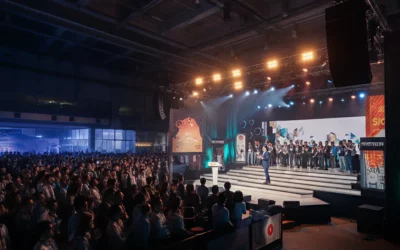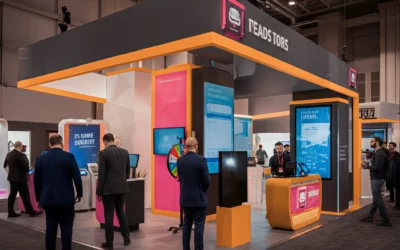Corporate events aren’t what they used to be. Gone are the days of basic cocktail hours and uninspiring PowerPoints. Today’s corporate event managers are stepping into dynamic, multi-faceted roles that require them to be logistics experts, experience designers, data analysts, tech wizards, and brand ambassadors all rolled into one.
Hiring managers, take note. Between 2024 and 2027, the landscape of corporate event management will continue shifting rapidly, and the role you’re filling today might look wildly different tomorrow.
Whether you’re recruiting your company’s first in-house event strategist or expanding an established team, understanding this evolution is critical. Here, we’ll explore the emerging demands shaping the profession, examine the skills modern event managers bring to the table, and highlight what it takes to stay ahead in this fast-paced industry.
From Planner to Experience Strategist
A decade ago, an event planner’s success was measured by logistical execution. Did the event run on time? Was the coffee hot? Did the AV setup work smoothly? Those basics still matter, but the role of corporate event professionals has expanded far beyond checklists.
Today, the modern event manager is more than a planner; they’re a strategic collaborator. Industry leaders have even suggested that “event planner” be replaced with titles like “business event strategist” to better reflect the transformation. Why? Because the focus has shifted from organizing events to crafting experiences that directly contribute to business objectives like strengthening brand perception, driving sales, and increasing employee engagement.
This new mindset requires event managers to align event goals with larger company strategies. They’re designing gatherings that don’t just meet expectations but inspire action and deliver long-term value. Consider this a shift from logistics wizardry to experience architecture, where the goal isn’t just to make the event happen but to make it memorable.
Modern corporate event pros are upping their game with:
- Immersive Themes that resonate emotionally with attendees.
- Surprise Moments that spark delight and engagement.
- Tailored Content that ensures every interaction reinforces key messages.
It’s no wonder that 85% of event professionals say they aim to improve their skills in designing live experiences. Creativity and innovation have officially become foundational competencies in this field.
Navigating Hybrid Events with Finesse
Another major evolution? The rise of hybrid events, a format that combines in-person gatherings with global digital participation. Planning a hybrid event isn’t just about streaming content online. It’s about ensuring that onsite participants have engaging, tactile experiences, while virtual attendees feel just as immersed.
This trend isn’t slowing down. Nearly 97% of event professionals predict hybrid events will continue to grow in popularity, owing to their flexibility and the ability to reduce travel costs. Hybrid gatherings allow brands to extend their reach, ensuring access for stakeholders across geographies and demographics.
But hiring someone who can successfully orchestrate both sides of the experience is vital. Hybrid events demand:
- Mastery of stage production for live and streamed audiences.
- Facilitating interactivity with tools like live Q&A, polling, and event apps.
- Strategies for managing multiple time zones and dual audience dynamics.
Today’s event managers are creating strategic playbooks for hybrid success, blending technology and creativity to engage every participant effectively.
The Power of Data and Analytics in Event Strategy
The data-driven nature of the modern events industry cannot be overstated. Event managers of today are swimming in analytics and loving it. They’re not just looking at attendance numbers; they’re mining insights that assess engagement, session popularity, and more.
These insights enable:
- Smarter content curation.
- Optimized venue layouts to improve attendee flow.
- Powerful follow-up campaigns that convert event energy into measurable outcomes.
Overseeing post-event metrics has also become a critical function. Event strategists track how effectively events achieve ROI goals such as lead generation, brand amplification, and attendee satisfaction. For hiring managers, it’s worth asking any prospective candidate just how comfortable they are living in an analytics dashboard.
Event Technology Is the New Event Playbook
Technology tools have redefined what’s possible in the events space. AI, automation, and analytics have become indispensable in creating exceptional experiences.
Here’s a glimpse at what top-tier corporate event managers now rely on:
- AI Matchmaking: These tools generate personalized networking or breakout session recommendations, ensuring every attendee gets the most out of the event.
- AI Chatbots: They provide on-demand assistance for attendees, such as answering FAQs or navigating event schedules.
- Event Apps and Automation Dashboards: These modern platforms handle registrations, send email reminders, and collect feedback in real-time, streamlining pre- and post-event tasks.
- Generative AI for crafting social media copy, post-event reports, and even highlight reels with minimal effort.
The goal? Free up time for event strategists to zero in on designing impactful moments while letting technology handle the logistics.
Hiring Trends Worth Considering
The title “event planner” doesn’t quite capture the scope of what’s needed anymore. Today’s job postings are moving toward more strategic wording like “event marketer” or “event experience manager,” reflecting the importance of this role in driving measurable outcomes. Many candidates now come equipped with not just organizational skills but also expertise in areas like storytelling, audience engagement, and even ESG (environmental, social, and governance) considerations for sustainable events.
These professionals aren’t just executing a task; they’re driving innovation and ensuring your company’s events deliver ROI.
Closing Thoughts
Hiring or managing a corporate event strategist means future-proofing your organization’s ability to stand out. From designing engaging hybrid experiences to analyzing data for better results, these pros are critical to ensuring your company thrives in today’s competitive landscape.
Think of them as your secret weapon. When done right, corporate events aren’t just gatherings. They’re moments of connection, inspiration, and transformation.
Looking ahead, organizations that invest in skilled, forward-thinking corporate event managers will not only set the bar but redefine it. Your next hire isn’t just filling a role; they’re shaping the future of your brand.
You might also like…
Revitalizing Sales Kickoff Events: Strategic Insights for 2026
Sales kickoff events (SKOs) are no longer just pep rallies – they’re mission-critical strategy...
Effective Meeting Management: 6 Tips to Elevate Every Business Meeting
Meetings often carry more dread than excitement. Many people see them as time drains rather than...
The Definitive Trade Show Event Planning Guide to Boost ROI in 2026/2027
Trade shows remain one of the most potent platforms for brand growth—when executed properly. Done...




